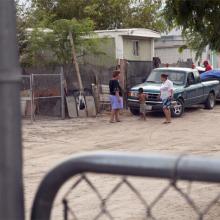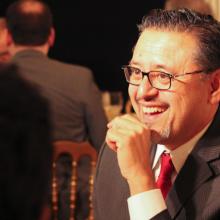executive action
When I asked Father Guy Wilson what the children of immigrant parents are telling him, amid the current inundation with media chatter, political rhetoric, and executive action on the topic of immigration, tears welled up in his eyes and one fell on his clerical shirt.
“It’s hard,” he said. “They are so scared.”
“Some of the teenagers have told me: ‘My parents are good people. They have never even had a traffic ticket. Why would anyone want to take them away from me?’”
The power of the order is found less in its immediate consequences, and more in its trajectory-setting results. While the world is slowly backing away from a crumbling cliff, this executive order represents a shift into drive to send the global climate hurtling toward the ledge.

Image via Evan El-Amin/Shutterstock.com
On Nov. 14, in a press conference at the White House, President Obama spoke about the possibility that President-elect Donald Trump may get rid of his executive action "Deferred Action for Childhood Arrivals" (DACA). DACA enables undocumented immigrants who arrived in the U.S. before their sixteenth birthday, before June 15, 2007, to remain in the country without fear of deportation and receive a two-year work permit that can be renewed.

Image via Drop of Light/Shutterstock.com
President Obama signed an executive action Jan. 29 requiring large companies to disclose to the government how much they pay employees, broken down by race, gender, and ethnicity. This executive action, which applies to companies with 100 or more employees, is aimed in part at reducing the gender wage gap in the U.S., which leaves women earning 79 cents for every dollar earned by men.
The Supreme Court’s decision to take up the case now is highly significant, since it means that the court will rule on the matter during this term (likely by the end of June), allowing President Obama and his administration to at least begin moving forward with implementation before he leaves office.
FOR IMMEDIATE RELEASE
Contact: Michael Mershon, Director of Advocacy and Communications
202-745-4654
January 6, 2016
The White House released the details of President Obama's latest executive action on Jan. 4, and the eagerly expected announcement will be suffixed by a live town hall meeting on gun control at 8 p.m. Thursday at George Mason University in Fairfax, Va. While some are lamenting that the actions don't go far enough, the measures will tighten up existing laws.
The plan is divded into four topics: background checks, community safety, mental health, and gun safety technology. Here's what you need to know about each.
Hundreds of immigrants and advocates from across the country gathered in New Orleans last week in support of President Obama's executive action programs on immigration. On April 17, the 5th Circuit Court heard oral arguments on the injunction filed in Texas v. the United States, which seeks to halt implementation of the executive action across the United States.
In February, federal district court Judge Andrew Hanen issued an injunction which temporarily delayed the extended 2012 Deferred Action for Child Arrivals (DACA) and Deferred Action for Parental Accountability (DAPA) programs — programs that could protect as many as 5 million undocumented individuals.
A ruling is expected to be released within a few weeks but could come as early as this week.
The Department of Justice and many immigrants’ rights advocacy groups, including many in the faith community, have been diligently working to protect DAPA and DACA and demonstrate the negative impacts — including economic costs — that Judge Hanen’s ruling has created for communities across the country.
Fortunately, the procedure to lift the injunction has been fast-tracked by the 5th Circuit Court, meaning that the judicial process has been sped up given the urgency of the overall case. Carl Tobias, a law professor at the University of Richmond, believes that the decision to accept the fast-track of the injunction is positive for the federal government because “it shows how the 5th Circuit seems to recognize that it is a very important case.”
IN OCTOBER 2013, an ad hoc group of humanitarians in Tucson, Ariz., chained themselves under buses scheduled to bring undocumented immigrants to trial at the federal district courthouse. The protests were aimed at Operation Streamline, which requires federal criminal charges to be brought against every person accused of an illegal border crossing. The action halted, for one day, Operation Streamline’s en masse prosecution of groups ranging from 50 to 100 people.
Under Operation Streamline, implemented under the Bush administration, deportation cases shifted from civil immigration authorities to federal criminal courts, a move that forced undocumented immigrants into the federal criminal justice system and into U.S. prisons. Operation Streamline is undergirded by a 2005 Customs and Border Patrol program called the Consequence Delivery System (CDS), which “guides management and agents through a process designed to uniquely evaluate each subject and identify the ideal consequence to break the smuggling cycle.” Using CDS, a first border-crossing offense is treated as a misdemeanor, punishable by up to six months in prison. Those who are caught a second time face deportation and possible felony convictions punishable by up to 20 years in prison.
Prior to CDS, border crossers without proper documentation were rarely prosecuted as criminals; instead, they were “administratively deported” through the civil immigration system. Under fast-track programs such as Operation Streamline, a federal criminal case—with prison and deportation consequences—can be completed in two days or less.
IF YOU'VE been following Sojourners’ work for the past few years, you know that we have been deeply involved in efforts to reform our nation’s broken immigration system. In the wake of President Obama’s game-changing executive actions in November and the political firestorm they ignited, it’s appropriate for us to reflect on how we got to where we are today and where we might go from here.
After the 2012 elections, it seemed all but certain that we would see comprehensive immigration reform become law during the 113th Congress. The electorate in 2012 had a higher percentage of Latino voters than ever before, in keeping with our country’s changing demographics. The mandate seemed clear for political leaders on both sides of the aisle to prioritize immigration reform or risk alienating a constituency vital to winning future elections.
Beyond this narrow political calculus, however, many of us became deeply involved in the struggle for immigration reform because we strongly believe that fixing our broken immigration system is a moral imperative, and long overdue. Our faith as Christians compels us to struggle for a more humane immigration system. Indeed, the scriptures could not be clearer. In the Old Testament, the Lord commands: “Also you shall not oppress a stranger, for you know the heart of a stranger, because you were strangers in the land of Egypt” (Exodus 23:9).
I am a newly minted American. Four years ago I passed the naturalization test and took the oath of allegiance to the United States. But I had been living as a citizen before I took the oath. Those who do not have the legal status of citizen often act as citizens. They attend PTA meetings, pay taxes, and engage in spirited public discussions about the common good. Citizenship is not only a legal status, but also a moral category and a set of practices.
President Obama recognizes this. Last night’s address described executive actions that will protect up to five million people from deportation and provide them with permits to work legally. People without valid immigration documents will be eligible to stay in the country temporarily if they have lived in the United States for more than 5 years, if they have children who are American citizens or legal residents, and if they register and pass criminal background checks.
Obama is not offering people citizenship, but his address reflected on the meaning of community belonging. “These people” often act like citizens, he seemed to be saying, because they “came to work, and study, and serve in our military, and above all, contribute to America's success.” To those of us who are citizens legally, Obama also had a message: Become better Americans.
While Republican leaders blast President Obama for taking executive action on immigration reform, some prominent evangelical leaders are welcoming the president’s plans to keep about 5 million undocumented immigrants from being deported.
Evangelicals are a key voting bloc for the GOP, but on immigration some are taking a pragmatic step away from the party. They include Hispanic leaders such as the Rev. Samuel Rodriguez who say the time has come to manage what has become a “de facto humanitarian crisis” for millions of immigrants.
“This merciful action takes place because for years our government, under the leadership of both parties, failed miserably as it pertains to immigration,” said Rodriguez, president of the National Hispanic Christian Leadership Conference.
Rodriguez planned to be with Obama on Nov. 21 in Las Vegas, where the President hopes to rally for his new steps.
Editor's Note: Thursday evening, President Barack Obama announced he is taking action to reform pieces of our broken immigration system. See Sojourners President Jim Wallis' recap here. Below are President Obama's remarks as prepared for delivery.
My fellow Americans, tonight, I’d like to talk with you about immigration.
For more than 200 years, our tradition of welcoming immigrants from around the world has given us a tremendous advantage over other nations. It’s kept us youthful, dynamic, and entrepreneurial. It has shaped our character as a people with limitless possibilities – people not trapped by our past, but able to remake ourselves as we choose.
But today, our immigration system is broken, and everybody knows it.
Families who enter our country the right way and play by the rules watch others flout the rules. Business owners who offer their workers good wages and benefits see the competition exploit undocumented immigrants by paying them far less. All of us take offense to anyone who reaps the rewards of living in America without taking on the responsibilities of living in America. And undocumented immigrants who desperately want to embrace those responsibilities see little option but to remain in the shadows, or risk their families being torn apart.










